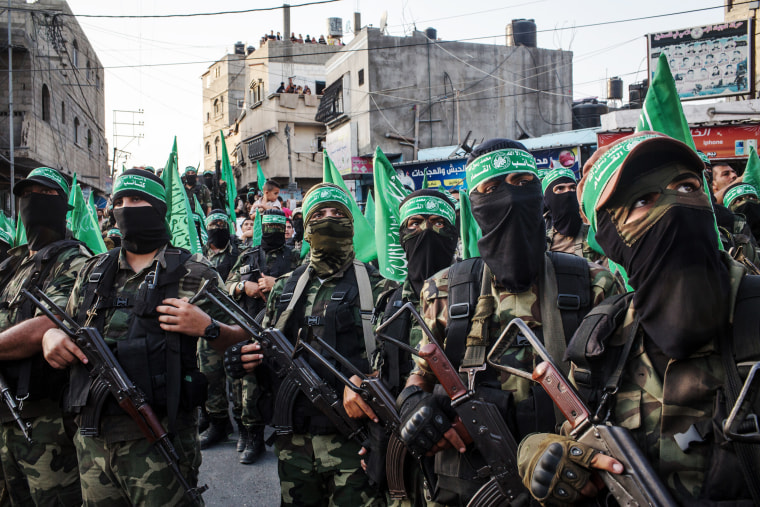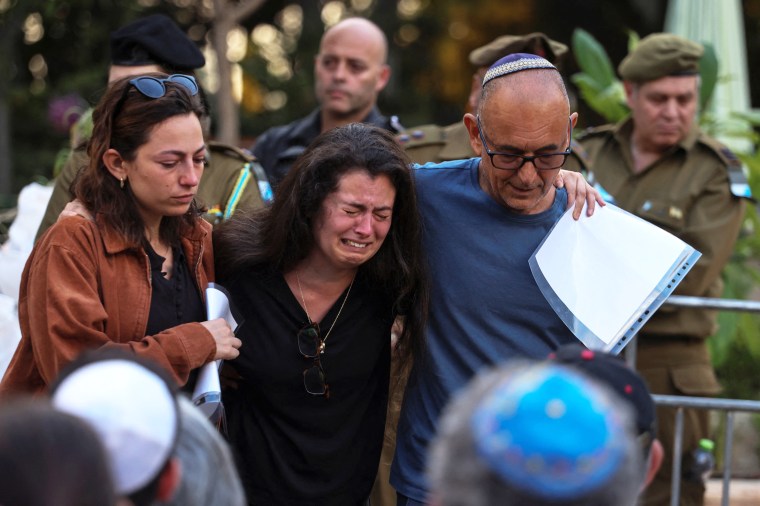What is Hamas?
Hamas is a militant group that carried out the worst terrorist attack in Israel in decades on Saturday, killing 900 people and taking captive dozens of soldiers and civilians. The group, which is currently led by Ismail Haniyeh, is also one of the two major political organization in the Palestinian territories. Its main rival is Fatah, which is seen as more secular and moderate and controls the Palestinian Authority in the West Bank.
Founded in 1987 during an uprising against Israel’s occupation of Gaza and the West Bank, Hamas was originally a branch of the Muslim Brotherhood, an Islamist political and social movement originating in Egypt. In recent years, Hamas has distanced itself from the Brotherhood.
Shortly after Hamas won elections in the Gaza Strip in 2006, a power struggle ensued between Fatah and Hamas, which resulted in Hamas fighters’ ousting all Fatah politicians from the Gaza by force. Since then, no elections have been held, and Hamas maintains political control of the area.
In 2007, Israel began taking control of sea, land and air routes to Gaza, and it eventually blockaded it, in conjunction with Egypt, which also borders a smaller section of the strip, saying it was necessary to prevent Hamas attacks on Israelis. The United Nations and human rights groups have condemned the blockade, which is entering its 17th year, and critics say it has allowed Hamas to fill a power vacuum there.
The U.S., the U.K., the European Union, Canada and many other countries have designated Hamas as a terrorist organization because of its attacks on Israel, which include kidnapping civilians, conducting suicide bombings and firing rocket salvos into Israeli cities.
After the Hamas attack on Saturday, the U.S., the U.K., France, Germany and Italy condemned the group. “All of us recognize the legitimate aspirations of the Palestinian people," they said in a joint statement. "But make no mistake: Hamas does not represent those aspirations, and it offers nothing for the Palestinian people other than more terror and bloodshed."

Other countries, including New Zealand, deem only Hamas’ military wing, which is called the Qassam Brigades, to be a terrorist group. The U.N. has not designated any part of the organization as a terrorist group. In addition to its militant activity, Hamas provides social services for people in Gaza, such as education and medical care.
Hamas says it is a freedom-fighting movement trying to free Palestinians from occupation and reclaim large parts of Israel. Its tactics are divisive among Palestinians and those who support establishing a Palestinian state because of its use of violence. As peace talks have repeatedly failed, its attacks have grown more popular among Palestinians.
A recent poll by the Palestinian Center for Policy and Survey Research, based in Ramallah, found that nearly a quarter of Palestinians said movements like Hamas were “the most positive thing that has happened to the Palestinian people since 1948.” The poll reported that an even higher proportion — one-third — lamented political divisions among Palestinians, calling the political split between Hamas and Fatah the most damaging development since the occupation began.

What is Iran’s relationship with Hamas?
Hamas has had ties to Iran for decades, according to the Washington Institute for Near East Policy. In the early 1990s, the Iranian regime hosted conferences as a “counterweight to the ongoing Arab-Israeli peace process” at which Hamas delegates “began developing high-level contacts in Iran.”
In 1992, Israel began deporting Hamas leaders to Lebanon. Iran and Hezbollah, a Tehran-backed Islamist militant group and Lebanese political party, hosted Hamas members and taught them how to build suicide bombs. According to the Washington Institute for Near East Policy’s analysis, Iran began “sending the group up to $50 million annually.”
In recent years, Iran has provided military hardware to Hamas, particularly missiles, according to research by the Wilson Center, a nonpartisan research institute in Washington. Iranian officials also disclosed that some Hamas operatives went to Tehran for training and that Iran has shared missile technology with the group.
Current and former U.S. officials say the unprecedented scale and sophistication of Hamas’ recent attack indicate that Iran most likely played a significant role. The Iranian regime publicly praised Hamas for the surprise attack Saturday, including staging street celebrations. But a spokesperson for Iran’s Foreign Affairs Ministry said on Monday that Tehran had played no role in the attack, dismissing such allegations as “politicized.”
When was the last conflict between Hamas and Israel?
Israel and Hamas waged an 11-day war in 2021 that killed 248 Palestinians and 12 Israelis. The conflict began when dozens of Palestinian families faced possible evictions from their homes in East Jerusalem’s historic neighborhood of Sheikh Jarrah as part of a long legal battle with Jewish settlers. Clashes among Israeli police, Palestinian worshippers and nationalist Israelis led to days of violence in and around Al-Aqsa Mosque.
Hamas then launched more than 2,000 rockets primarily targeting Ashkelon and Tel Aviv. Many were brought down by Israel’s Iron Dome anti-missile system. For Israelis, the rocket barrage, which killed a dozen people, was the most deadly attack on their soil since 2014.
The U.N. said that Israeli forces may have committed war crimes during the conflict and that Hamas’ indiscriminate rocket fire was also a clear violation of the rules of war. Some Palestinians praised Hamas for defending them, and a poll taken at the time found that 53% of Palestinians viewed Hamas as most capable of representing the Palestinian people. Only 14% chose Fatah.
How has Hamas changed in its 30-year history?
For decades, Hamas called for the destruction of Israel. In 2017, 30 years after its founding, the group issued a new charter that appeared to stop short of that goal. The document, known as the Hamas 2017 charter, was the first time the group had shown a willingness to accept a Palestinian state that would fall within the borders that existed in 1967, consisting of the West Bank, Gaza and all of Jerusalem.
Hamas' charter describes the Palestinians as “a people who have been let down by a world that fails to secure their rights and restore to them what has been usurped from them, a people whose land continues to suffer one of the worst types of occupation in this world.”
The move was seen as an attempt by Hamas to improve its relations with the Egyptian government by breaking away from the Muslim Brotherhood, which had been outlawed in Egypt. Hamas, however, stuck to its hard-line refusal to acknowledge Israel’s existence, referring to it as a “Zionist entity,” or consider any previous Israeli-Palestinian peace deals, such as the Oslo Accords. Israel and Palestinian Authority President Mahmoud Abbas both rejected the charter.
